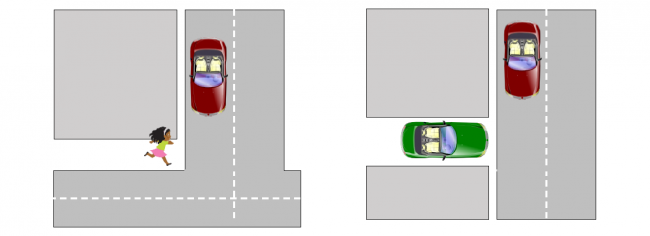
Automatic detection of people, cars, and obstacles is critical for future driver assistance systems and robot navigation. This is particularly important when the object is not in the field-of-view of the car and its driver. Many accidents happen today due to inability to detect a child running around the corner or a car pulling out of an occluded driveway, as shown in the figure below. The future of driver assistance systems and autonomous cars critically depends on how well they can deal with blind spots and hidden objects. Unfortunately, existing sensing technologies based on vision and LIDAR systems cannot operate in non-line of sight, and hence fail to deal with such scenarios. This motivates the need for additional sensing technologies that can operate through occlusions and around corners. Thus, the purpose of the proposed research is to develop a system that enables detecting cars and people in non-line-of-sight. We develop new millimeter wave systems that can track vehicles and objects through occlusions. We address key challenges with this technology including beam alignment and working around occlusions.
Publications:
-
O. Abari, D. Bharadia, A. Duffield, and D. Katabi, “Enabling High-Quality Untethered Virtual Reality,” in 14th USENIX Symposium on Networked Systems Design and Implementation (NSDI 17), Boston, MA, 2017, pp. 531–544 [Online]. Available: https://dl.acm.org/citation.cfm?id=3154674
-
O. Abari, H. Hassanieh, M. Rodriguez, and D. Katabi, “Millimeter Wave Communications: From Point-to-Point Links to Agile Network Connections,” in HotNets ’16 Proceedings of the 15th ACM Workshop on Hot Topics in Networks, Atlanta, GA, USA, 2016, pp. 169–175 [Online]. Available: https://doi.org/10.1145/3005745.3005766
-
O. Abari, H. Hassanieh, M. Rodreguiz, and D. Katabi, “A millimeter wave software defined radio platform with phased arrays: poster,” in Proceedings of the 22nd Annual International Conference on Mobile Computing and Networking - MobiCom ’16, New York City, New York, 2016, pp. 419–420 [Online]. Available: https://doi.org/10.1145/2973750.2985258


